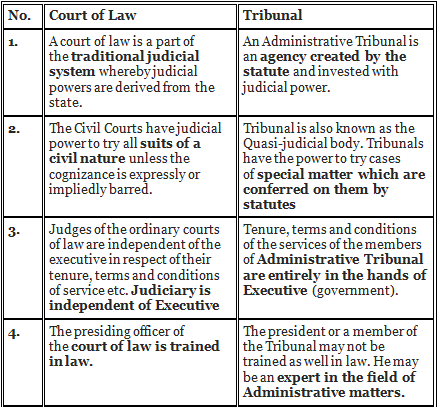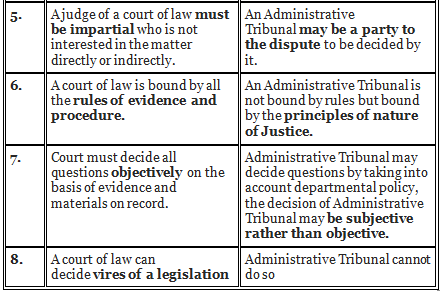UPSC Exam > UPSC Notes > Famous Books for UPSC Exam (Summary & Tests) > Tribunals- Characteristics, Merge and Difference
Tribunals- Characteristics, Merge and Difference | Famous Books for UPSC Exam (Summary & Tests) PDF Download
Characteristics of Administrative Tribunals
- Administrative Tribunal is a creation of a statute.
- An Administrative Tribunal is vested in the judicial power of the State and thereby performs quasi-judicial functions as distinguished from pure administrative functions.
- Administrative Tribunal is bound to act judicially and follow the principles of natural justice.
- It is required to act openly, fairly and impartially.
- An Administrative Tribunal is not bound by the strict rules of procedure and evidence prescribed by the civil procedure court.
Merging of Tribunals
The Finance Act of 2017 merged eight tribunals according to functional similarity. The list of the tribunals that have been merged are given below:
- The Employees Provident Fund Appellate Tribunal with The Industrial Tribunal.
- The Copyright Board with The Intellectual Property Appellate Board .
- The Railways Rates Tribunal with The Railways Claims Tribunal.
- The Appellate Tribunal for Foreign Exchange with The Appellate Tribunal (Smugglers and Foreign Exchange Manipulators (Forfeiture of Property) Act, 1976.
- The National Highways Tribunal with The Airport Appellate Tribunal.
- The Cyber Appellate Tribunal and The Airports Economic Regulatory Authority Appellate Tribunal with The Settlement and Appellate Tribunal (TDSAT) .
- The Competition Appellate Tribunal with the National Company Law Appellate Tribunal.
Difference Between Tribunal and Court
- Administrative Tribunals and Ordinary Courts both deal with the disputes between the parties which affects the rights of the subjects.
- Administrative Tribunal is not a court. Some notable differences between a court and Administrative Tribunal are as follows -


The document Tribunals- Characteristics, Merge and Difference | Famous Books for UPSC Exam (Summary & Tests) is a part of the UPSC Course Famous Books for UPSC Exam (Summary & Tests).
All you need of UPSC at this link: UPSC
|
743 videos|1444 docs|633 tests
|
FAQs on Tribunals- Characteristics, Merge and Difference - Famous Books for UPSC Exam (Summary & Tests)
| 1. What are the characteristics of tribunals? |  |
Ans. Tribunals have several characteristics that distinguish them from regular courts. Some of these characteristics include:
- Specialization: Tribunals are established to deal with specific areas of law or specific types of disputes, such as employment, immigration, or tax matters.
- Informality: Tribunals tend to have less formal procedures compared to regular courts, allowing for a less adversarial and more accessible process.
- Expertise: Tribunals are often composed of members with specialized knowledge or experience in the area of law they deal with, ensuring that decisions are made by individuals who understand the specific issues involved.
- Accessibility: Tribunals aim to provide a more accessible and user-friendly process, allowing individuals to represent themselves without the need for legal representation.
- Speed and efficiency: Tribunals are designed to resolve disputes in a timely manner, often with shorter waiting times and faster decision-making processes compared to regular courts.
| 2. How can tribunals be merged? |  |
Ans. The merger of tribunals can occur through various mechanisms, depending on the legal framework of a particular jurisdiction. Some common methods of merging tribunals include:
- Legislative changes: Governments can pass legislation to merge two or more tribunals into a single entity, thereby consolidating their functions and resources.
- Administrative orders: Administrative bodies or government agencies responsible for overseeing tribunals can issue orders or directives to merge specific tribunals under their jurisdiction.
- Judicial or executive decisions: In some cases, courts or executive authorities may order the merger of tribunals through their decision-making powers.
- Constitutional amendments: In certain jurisdictions, the merger of tribunals may require amendments to the constitution to ensure legal validity and compliance.
| 3. What is the difference between tribunals and regular courts? |  |
Ans. Tribunals and regular courts differ in several key aspects:
- Jurisdiction: Tribunals have limited jurisdiction and deal with specific areas of law or types of disputes, while regular courts have broader jurisdiction and handle a wide range of cases.
- Procedure: Tribunals often have less formal procedures compared to regular courts, with a focus on informality, accessibility, and flexibility.
- Decision-making process: Tribunals may have single adjudicators or panels of members, while regular courts typically have judges presiding over cases.
- Legal rules and standards: Tribunals may apply specialized laws or regulations specific to their area of jurisdiction, whereas regular courts apply general laws and legal principles.
- Appellate process: The appeal process in tribunals may differ from that of regular courts, with specific mechanisms and rules for challenging tribunal decisions.
| 4. What is the role of tribunals in the legal system? |  |
Ans. Tribunals play a crucial role in the legal system by providing specialized and accessible avenues for resolving disputes in specific areas of law. Their role includes:
- Expertise: Tribunals often consist of members with specialized knowledge or experience in the particular area of law they oversee, ensuring decisions are made by individuals well-versed in the subject matter.
- Efficiency: Tribunals aim to resolve disputes in a timely and efficient manner, reducing backlog and providing faster access to justice compared to regular courts.
- Accessibility: Tribunals strive to be more accessible to individuals, allowing them to represent themselves without the need for legal representation.
- Specialization: Tribunals focus on specific areas of law, allowing for a deeper understanding of the issues involved and promoting consistency and expertise in decision-making.
- Administrative functions: Tribunals may also have administrative functions, such as issuing licenses, permits, or conducting inquiries related to their area of jurisdiction.
| 5. How are tribunal decisions enforced? |  |
Ans. The enforcement of tribunal decisions depends on the legal framework of a particular jurisdiction. Some common methods of enforcing tribunal decisions include:
- Compliance orders: Tribunals may have the power to issue compliance orders, requiring the parties involved to comply with the decision or face penalties or sanctions.
- Judicial enforcement: In some cases, tribunal decisions can be enforced through regular courts. The tribunal may seek a court order to enforce its decision, and failure to comply can result in contempt of court proceedings.
- Administrative mechanisms: Administrative bodies or government agencies overseeing tribunals may have mechanisms to enforce decisions, such as imposing fines, suspending licenses, or taking other administrative actions.
- Voluntary compliance: Parties involved in a dispute may voluntarily comply with the tribunal decision without the need for enforcement measures. This can be facilitated by the tribunal's reputation, the clarity of the decision, and the willingness of the parties to resolve the matter.
Related Searches





















